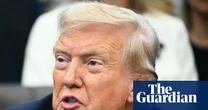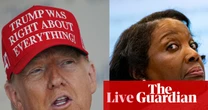During the last Trump presidency, Barbie was firmly at the center of progressive causes.
Back in 2017, the BarbieStyle Instagram feed featured dolls wearing “Love Wins” T-shirts to show their support of marriage equality; some posts even subtly suggested that Barbie was in a same-sex relationship with a brunette called Aimee. Another post featured Barbie wearing a “People Are People” T-shirt designed by Christian Siriano to protest Trump’s immigration ban. That same year, Mattel rolled out Barbie dolls with more diverse body types, along with Muslim dolls that wore hijabs.
With President Donald Trump back in the White House, it’s unclear whether the Barbie brand will remain a progressive icon. Mattel—Barbie’s parent company—has dropped language surrounding DEI in a proxy statement to investors ahead of its annual shareholder meeting, a fact first reported in Bloomberg Law. Last year’s statement included language that said Mattel would “create positive impact through purposeful play and by supporting diverse, equitable, and inclusive communities.” This year, that language has vanished. Mattel also removed a table reflecting the gender and racial breakdown of its board members.
Mattel’s public facing corporate website has also scrubbed references to DEI. In April 2024, the “Citizenship” section of this website said, “Our aim is to contribute to a more diverse, equitable, inclusive, and sustainable future.” As of the publication of this story, that line has now been deleted.
A spokesperson from Mattel said the change in language was just a “reporting change” and would not change its approach nor its product commitments. She also pointed that the company publishes its Inclusion Guiding Principles on its corporate website, which mentions promoting equality. “Inclusion is part of our DNA at Mattel,” the spokesperson told Fast Company. “We foster an environment that attracts incredibly talented people and a culture of respect and belonging that we’re very proud of. As it relates to our products and experiences, play is our language, and we speak to our consumers authentically by representing the world as they see and imagine it.”
In this political climate, the company’s decision to eliminate references to DEI in its correspondence with investors and consumers is notable, suggesting that it is feeling the heat from the Trump administration’s relentless attacks on corporate DEI policies. Hours after taking office in January, Trump dismantled the federal government’s DEI agenda, and asked federal agencies to draw up lists of private companies that could be investigated for “illegal DEI discrimination.”
In response, dozens of companies, such as Jetblue, Meta and Walmart, have toned down their language supporting DEI or walked back their DEI commitments altogether. This, in turn, has led to a massive boycott effort from organizations like the Rev. Al Sharpton’s National Action Network, the People’s Union USA, and the NAACP. But there have been some companies who have used this moment to reaffirm their commitments to DEI, including CostCo and Kendra Scott, and have been rewarded for it by consumers who are flocking to shop from them.
Progressive have often been angriest at companies they once perceived as allies. Target, for instance, took a bold stance in the midst of the Black Live Matters protests in 2020, pledging to increase its Black workforce by 20% throughout the company and bring in more Black-owned brands. But when it rolled back its DEI efforts, it became the subject of a persistent and widespread boycott, which seems to be having an impact. The retailer’s foot traffic has been in decline for eight weeks now.
For Mattel, scaling back its DEI efforts could be similarly damaging. Over the past decade, the Barbie brand went through a transformation. For years, the brand had sluggish sales, as millennial parents perceived the doll as reflecting old-fashioned values, such as being skinny, beautiful, and attractive to men. But Richard Dickson, Mattel’s CEO from 2000 to 2023, helped make Barbie more exciting and aligned with millennial culture. He oversaw the brand’s efforts to roll out a wider range of dolls, with different body types and gender expressions. And perhaps most impressively, he helped unleash the blockbuster Barbie movie which turned Barbie into a symbol of feminism and diversity. (Dickson was an executive producer on the movie; he left Mattel to become the CEO of Gap Inc. in 2023.)
Mattel’s spokesperson says that the company will not change its approach to products design or hiring. We’ll have to wait and see how the company continues to evolve in the months and years to come, but it’s clear that many consumers are paying close attention to brands that have stood for progressive values in the past and are now abandoning these ideals in the face of political pressure. If a brand like Barbie suddenly takes a turn away from inclusivity, it risks falling out of step with today’s parents and possibly even facing a Target-size backlash.








No comments